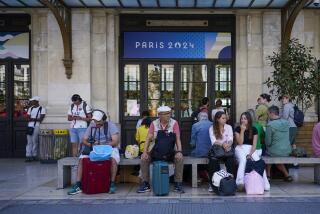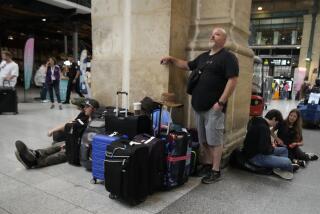More Suspects Arrested in Madrid Blasts
- Share via
MADRID — Spanish police investigating last week’s train bombings rounded up five new suspects, including one who might have supplied explosives and another who might have been one of the bombers, authorities said Thursday.
At least two of the five, who were described as four Moroccans and a Spaniard, were already known to anti-terrorist investigators, a senior Spanish law enforcement official said.
As the investigation gathered momentum, a magistrate began interrogating another five suspects already in custody on suspicion of supplying cellular phone components used as remote-control detonators. A judge was expected to decide today whether to hold the chief suspect, a Moroccan immigrant shopkeeper named Jamal Zougam, and the others for prosecution.
Their trail led to Alcala de Henares, the working-class suburb outside Madrid where police think a team of terrorists boarded commuter trains and secreted 10 backpack bombs that killed 202 people and wounded more than 1,500.
Police arrested three Moroccans near Alcala de Henares on Wednesday and Thursday, and the Spanish citizen was picked up in the northwestern city of Oviedo, a court spokeswoman said. The fifth suspect, another Moroccan, was arrested in the Madrid area, officials said.
Police believe that one of the suspects provided the more than 265 pounds of Spanish-made explosives, the senior law enforcement official said.
It does not appear that the explosives were stolen, the senior official said, but authorities are investigating how the group obtained the highly regulated substances.
Another man is suspected of having planted bombs aboard a train, the official said.
The arrests fortify the theory that the attacks last week are connected to suicide bombings in Casablanca, Morocco, last year and that Zougam is a central figure, law enforcement officials said.
“It appears Zougam had a relevant role as a coordinator,” the senior official said. “One of today’s suspects may be related to the provision of explosives. Another may have been on one of the trains. They appear to be connected to Casablanca -- that’s where things are heading.”
The use of Alcala de Henares is an important clue as well: Investigators believe its diverse immigrant community provided cover for the terrorists to conduct reconnaissance at the local train station. After the bombings, police found a van parked near the station containing detonators and a cassette recording of Koranic verses. A witness saw three men with their faces covered leave the van and walk into the station shortly before the blasts.
In a separate court hearing Thursday, the suspected chief of a Madrid cell of the Al Qaeda terrorist network, who has been in jail since late 2001, denied any link to the March 11 train bombings.
Imad Eddin Barakat, who awaits trial on charges of playing a support role for the Sept. 11 hijackers, insisted that Zougam was only an acquaintance from whom he bought vegetables and telephone calling cards.
“Also, he knew him from seeing him drink coffee in a bar on the corner,” said Barakat’s lawyer, Jacobo Teijelo. “They have never been friends, and they have never had a more profound relationship than that.”
But transcripts of telephone conversations intercepted by Spanish police suggest that Zougam regarded Barakat as a confidant, and called him a number of times in August and September 2001. Zougam made a trip to Morocco then that brought him into contact with known Islamic extremists, according to court documents.
Zougam called Barakat to advise him of his trip before he left, called again in a worried state after Spanish border police interrogated him, and called from Morocco to ask for phone numbers and contacts of known extremists, court documents show.
Zougam also called after returning to Madrid to report about his visit with a radical imam suspected of being the spiritual leader of Moroccan extremists involved in the Casablanca and Madrid attacks, according to the court documents.
Under Spanish law, Judge Juan del Olmo must decide whether to jail the five original suspects pending a decision to file charges, free them on bail or drop the prosecution. In addition to Zougam and his half-brother, the first five include a Moroccan who did business with them and two Indian immigrants allegedly involved in the sale of falsified telephone calling cards.
On Thursday, the death of an injured Peruvian woman raised the toll in the train bombings to 202.
Also, the government of outgoing Spanish Prime Minister Jose Maria Aznar released a file detailing the chronology of its response to the bombings.
The file included documents that were declassified to counter accusations that the government downplayed the possible role of Islamic terrorism in order to avoid a backlash blaming the attacks on Spain’s military presence in Iraq. The perception that the government withheld information contributed to an upset victory of the underdog Socialists.
The Aznar government quickly blamed Basque terrorists on the basis of initial intelligence reports, officials said. The file cites a report from the National Intelligence Center less than seven hours after the blasts asserting that “it is almost certain that the ETA terrorist organization is the author of these attacks.”
The investigation is now focusing on Islamic groups, but some law enforcement officials still regard some aspects of the attacks, such as the timing just before the general election, as atypical of Al Qaeda and its allies.
More to Read
Sign up for Essential California
The most important California stories and recommendations in your inbox every morning.
You may occasionally receive promotional content from the Los Angeles Times.













